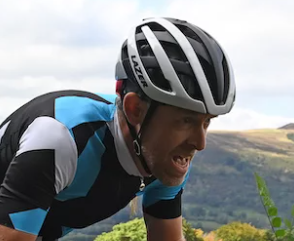How riding down a dead end road can lead you to climbing heaven
Do you turn down dead end roads on a voyage of discovery, or ride on past without a second glance? Here's why you shouldn't ignore them
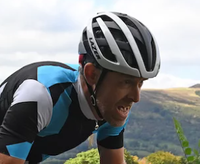
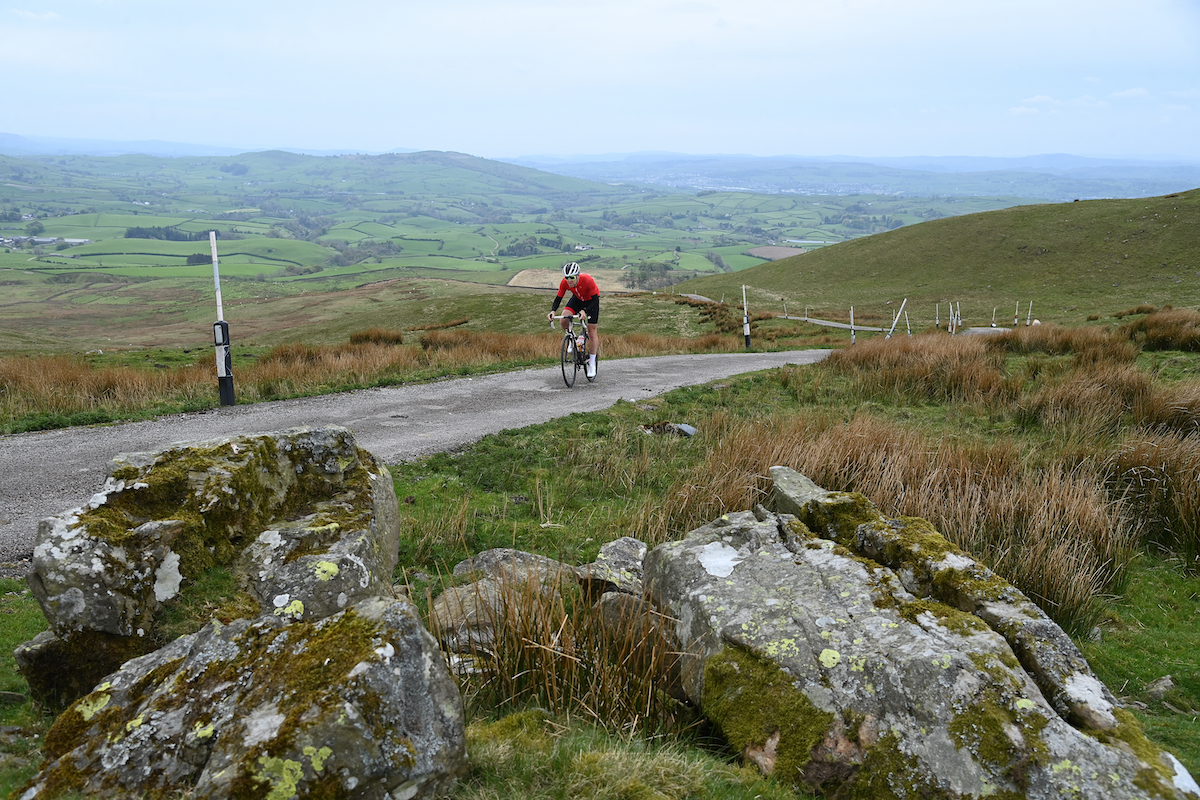
The latest race content, interviews, features, reviews and expert buying guides, direct to your inbox!
You are now subscribed
Your newsletter sign-up was successful
You see a dead end, I see an opportunity, you see a cul-de-sac, I see a potential summit finish. Don’t let that blue square with its bold red and white ‘T’ (or yellow diamond in the USA) turn you away, see it as an advert to adventure, an invitation to explore.
It may not be a through route but it will lead somewhere; and that somewhere may just be a magnificent, secluded part of the world that most people would have simply passed by.
The world is littered with such roads. Climbs to transmission masts, isolated farms and radar stations. One way streets to high altitude adventure and best of all, due to their nature they are almost all free of traffic.
UK riders may well have heard of such legendary climbs as The Cowlyd in Snowdonia, Abdon Burf in the Shropshire Hills and of course the mighty Great Dunn Fell, our very own mountain top finish in the Pennines, but these are just the tip of the iceberg. There are many more such wonders out there to discover and on this ride I introduce you to three absolute beauties.
To bag these magnificent climbs I have come to the North West, home to some of the best roads to nowhere set in some of England’s most beautiful scenery. With so much to choose from, dead end wise, the temptation to plot a massive 160km ride was strong. But I had to show restraint and from our long list of candidates picked three; Whinfell, Bullpot Lane and Leck Fell.
These fit nicely into a loop, but it does mean climbs such as Caton Moor, and one of my all time favourites the sublime Adamthwaite Bank didn’t make the cut. But please go search these roads out at your leisure.
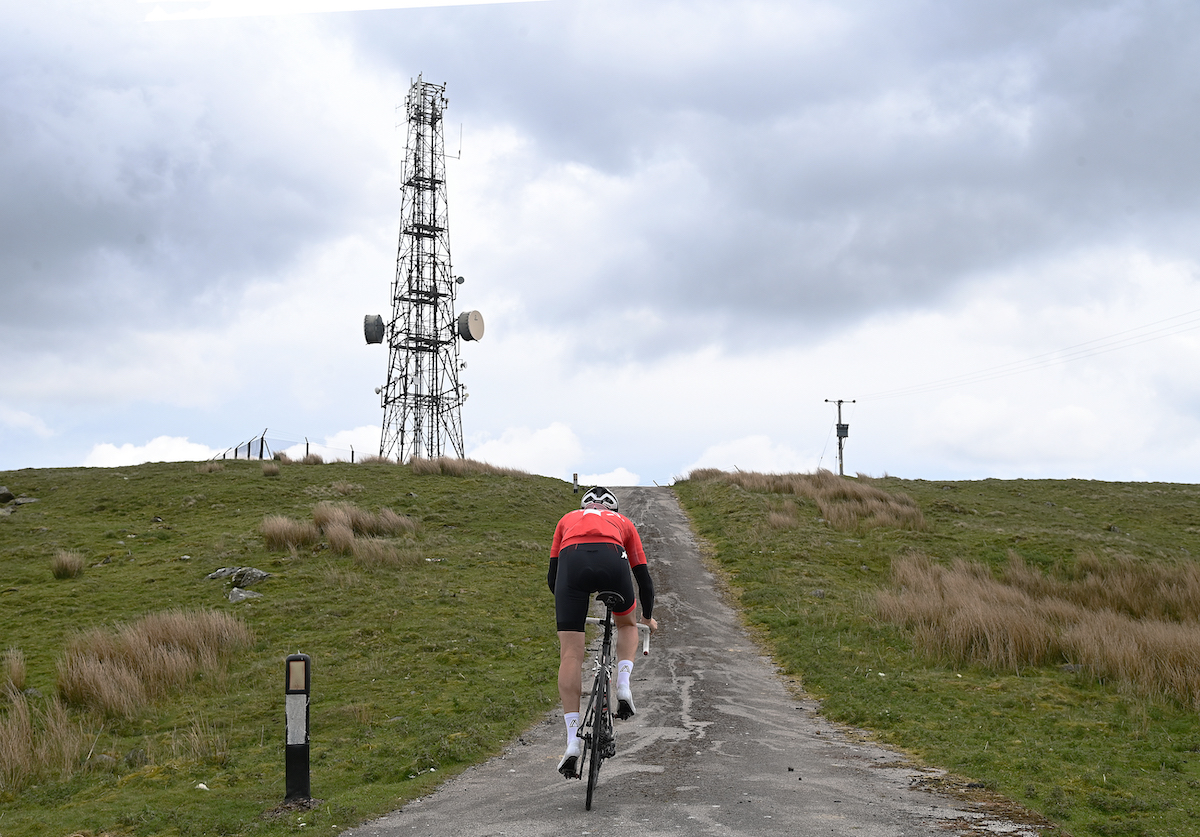
If you see a telephone mast on top of a hill, the chances are there's a road taking you up to it
Joining me at the end of the day, (nipping out on his lunch break) will be Toby Cummins co-owner of the Cold Dark North brand and unofficial president of the northern faction of the ‘Dead End club’. His knowledge of the roads in this corner of the country has lead me to many a vicious climb over the years, and it’s him I have to thank for introducing me to two of the beasts on this route.
The latest race content, interviews, features, reviews and expert buying guides, direct to your inbox!
To start with though I’m heading out solo from the small North Yorkshire town of Ingleton, and within a few minutes riding I'm on to the steady 11-kilometre climb through Kingsdale.
Subscribe to Cycling Weekly and get inspired to ride with more great routes
It’s not all uphill, as there are a couple of small descents, and it’s not all steady as there are also a few places were the gradient tips over into double figures but on the whole it’s not a nasty climb unlike the northern side of the pass.
What it is though is a deathly quiet road and achingly beautiful from the start to the summit on top of White Shaw Moss. Pausing here, with Whernside (the 2nd peak in the annual Three-Peaks cyclo cross race) looming over my right shoulder I take a moment to soak in the dazzling views out over Dentdale below before embarking on the hair-raising descent into the valley.
A note of warning here. Before you get too carried away with your need for speed just as there were on the way up there are two gates on the way down so keep your eyes peeled as you will have to stop and open them.
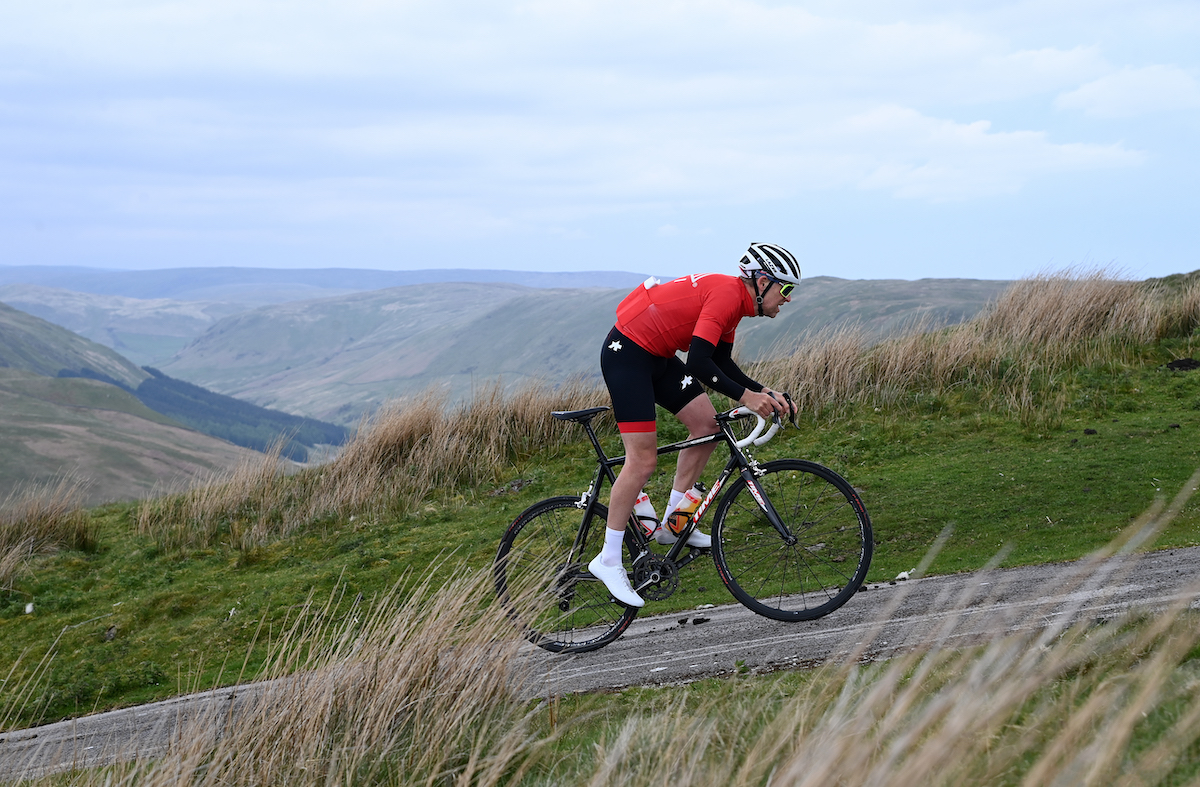
Steep gradients, quiet roads and incredible views. Just three reasons to ride a dead end road
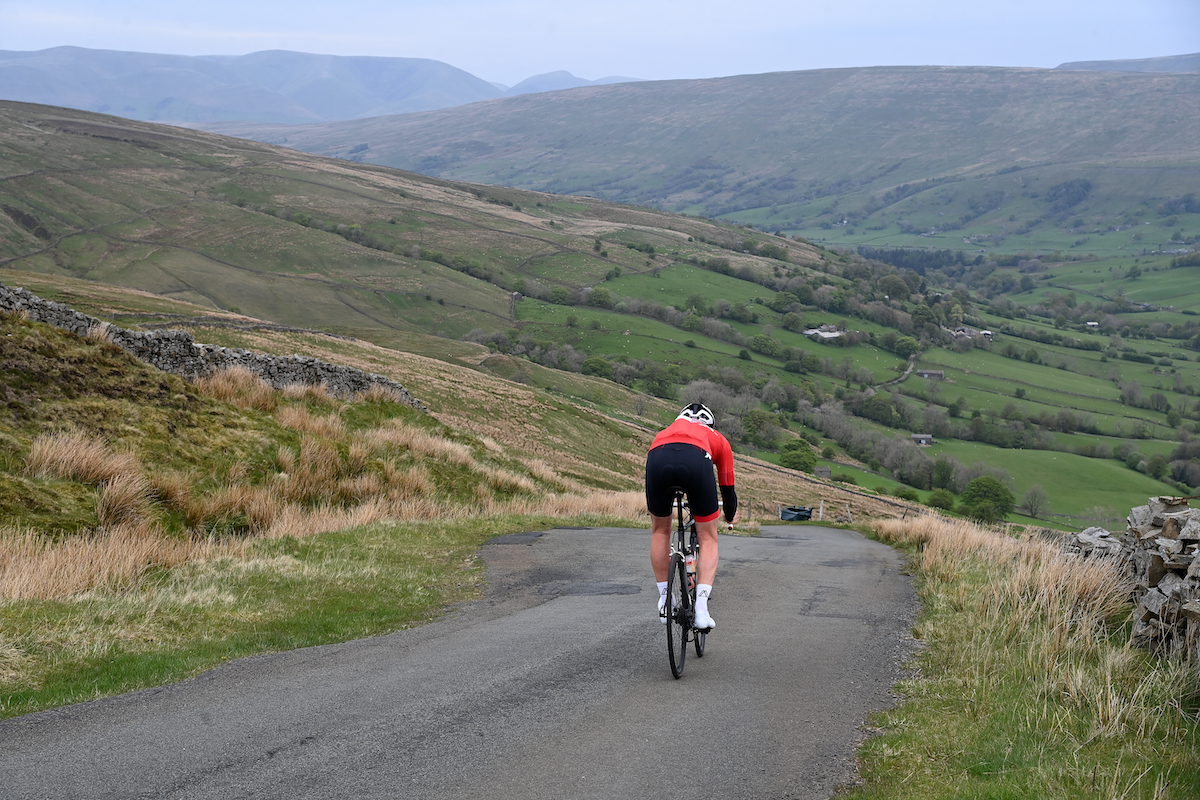
What goes up must come down
Once in Dentdale the route undulates alongside the River Dee and then, as if passing through some sort of worm hole into a land that time forgot you bisect the village of Dent with its immaculate cobbled streets before exiting the other side to continue onto the town of Sedbergh.
With just 26 kilometres covered it’s a bit early for a lunch stop, maybe a second breakfast if you so desire, before continuing the journey further north to the first of our dead ends. Meandering though the empty lanes I trace the River Lune, drop down to cross it then rise back up again under the 100 foot high Lowgill Viaduct.
Completed in 1859 to carry the train line from Clapham (in North Yorkshire, not London) to Ingleton it now just stands as a towering monument to 19th century engineering, and a pretty impressive one at that. There is a stiff climb away from underneath its giant arches before the course crosses the M6 motorway and makes its way to the village of Grayrigg.
For a few miles now if two masts standing proud on top of our first target of the day, the summit of Whinfell, overlook me. Riding north out of Grayrigg they are now more prominent on the horizon and passing a couple of farms I reach the base, guarded with a gate and sign declaring the road private.
Fear not however this just applies to vehicles so I can pass safe in the knowledge I’m allowed access if on two wheels. Nestled between the slightly higher peaks of Whinfell Beacon at 471metres and Grayrigg at 495 metres our summit reaches 439 meters and it’s one hell of a climb to get there.
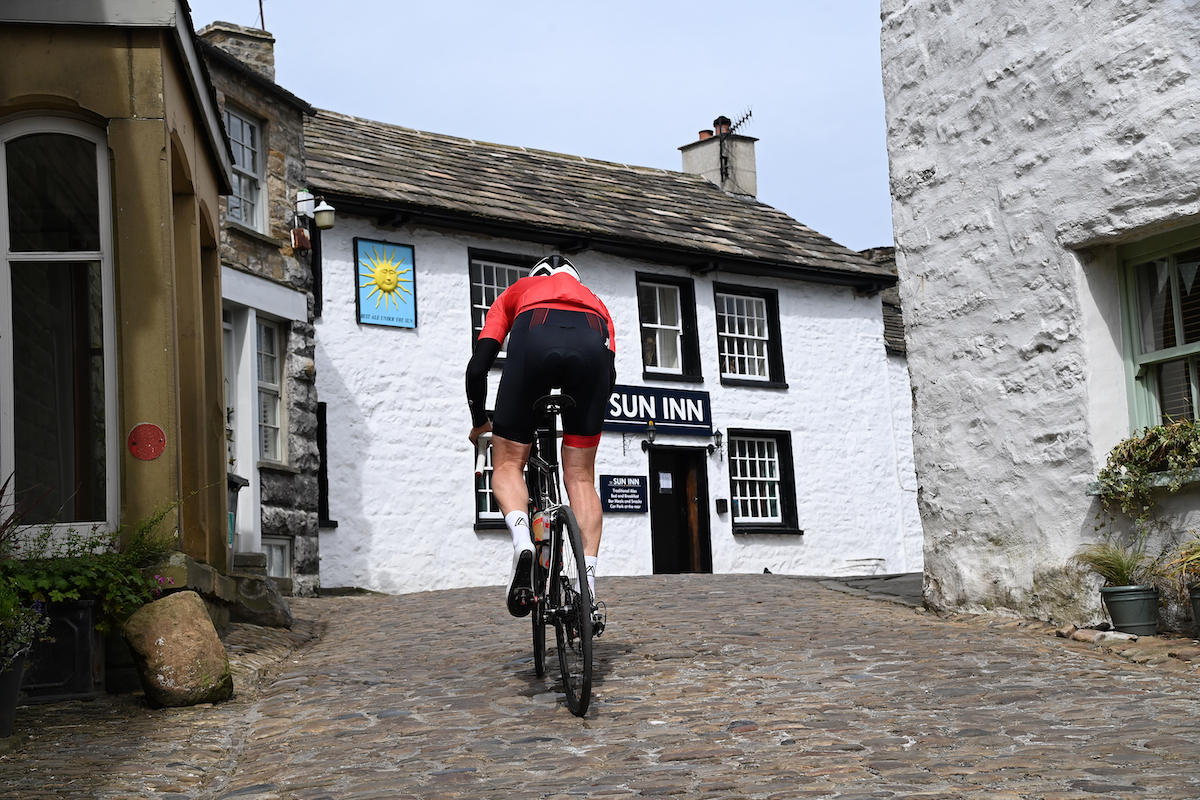
I can see the pub from here!
In front of me lie multiple cattle grids, closed gates, vicious 16% gradients and to top it all off the last stretch is on gravel, it has everything! The first gate is right at the bottom, this pretty much guarantees a traffic free ride but do keep an eye out for farm vehicles and sheep. Surprisingly well surfaced the gradient ebs and flows offering brief periods of respite early on before settling into its more remorseless upper slopes.
Not quite steep enough to warrant any cursing but stiff enough to force some serious groans I really am made to work hard to reach the first tower, and here is where the real fun starts. Rounding its caged compound on a brief levelling things quite rapidly turn agricultural as the previously smooth tarmac vanishes to be replaced by little more than grass and rocks. What’s more the ‘road’ then dips down slightly to the base of its final killer ramp to the true summit.
In ideal conditions such a dramatic change of surface would demand a bike change but as the Cycling Weekly helicopter was unavailable to drop one in I had to do the best I could on 25mm of slick rubber. Some of you may not fancy this last section but if you’ve come this far so you really have to get to the very top, don’t you. It might not be pretty and prepare to get some strange looks from the local sheep but it is possible, so get stuck in.
Once the summit tower is reached, soak in those views before taking on the descent, which is even more of a challenge, in fact it’s MTB territory so take great care back to the first tower then also remember the gates and grids on the way back to the bottom. Returning to Grayrigg and then via more quiet lanes to Sedbergh I have covered 60km so a stop here makes sense even if just to top up water and replenish pockets (or for you hip young folk, your bar bags).
Key Info
Where to eat
The village of Sedbergh, the most logical place to stop on the route, isn’t over-run with eating options but Smatt’s Duo Cafe is well regarded and does a fine plate of scrambled eggs - all the better to build your leg muscles with.
Where to stay
The small town on Ingleton where we stayed has a good fistful of accommodation options all for around £80 per night. The Inglenook Guest House provides warm welcoming rooms that a typical of what’s on offer.
Local bike shops
If you’re staying in Ingleton then just up the A65 is escape bike shop which caters to all kinds of cyclists and should have any supplies you need.
If you run into difficulty out on the route then your first port of call should probably be bike repair business Polka Dot Cycles in Sedbergh. James, who runs the place, may even come and meet you if you’re not too far away for a charge of £15 plus repair costs.
Leaving Sedbergh and tracing the route back through the flat roads of Dentdale affords us a period of calm before a barrage of climbing starts with the wicked ramp up out of Gawthrop. With sustained ramps of 15% this is arguably the stiffest test on the whole route but the rewards at the top though are immense, for it’s here you enter the one, the only, Barbondale. Without doubt the grandest dale in the land, this epic - and I mean epic - valley with its towering western flank is simply breath-taking. A sheer wall of smooth grassy hills, best witnessed basking in morning sun follows the entire length of the road and as I sink lower it climbs higher becoming grander and grander. Gradually descending though maybe England’s greatest natural wonder it’s almost heart wrenching to leave but with my mind and body are replenished by the sheer beauty of nature, so I’m now ready to tackle the twin brutes that lie ahead.
Plunging into the wild interior of the north Lancashire fells these next two roads, Bullpot and Leck Fell deliver us to two more places of tranquil beauty, oh and of course they are bloody tough climbs! Up first is Bullpot and when I was here last the wind was so strong I was almost blown clean off the hillside, thankfully today conditions are a little calmer as I start the three kilometres of climbing before me.
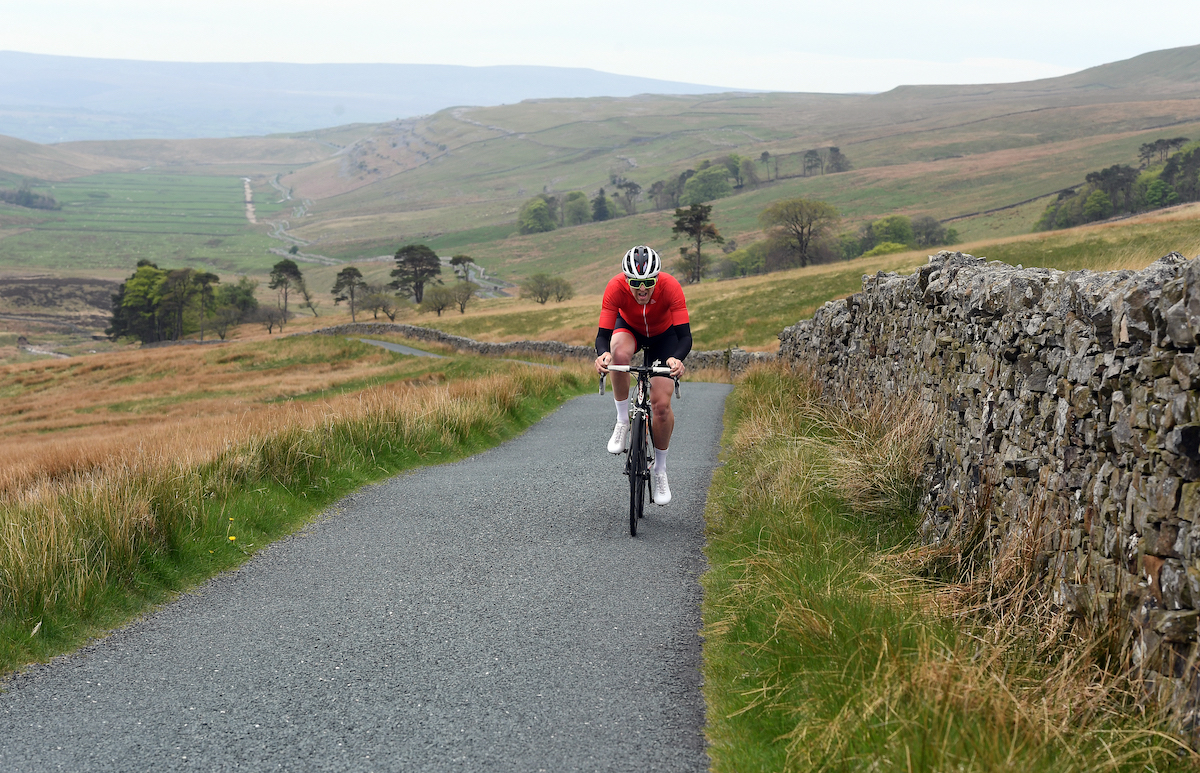
If the view is behind you, don't be afraid to stop and take it in
The first part of the climb is by far the toughest, it’s proper hard in places with tight bends and gruelling gradients but when I reach the 90 degree corner at just past half way the complexion of the ascent changes. Now immersed in the emptiness of the fells the slope recedes to further enhance our journey to nowhere.
Unlike Whinfell, Bullpot Road does not finish at its summit, it drops down to the farm nestled in the small valley below but we are going to turn where the altitude gain ends and retrace back down before embarking on our final climb.
A matter of a handful of kilometres away our last target, the ascent of Leck Fell is even more dramatic than Bullpot and it’s here I meet up with Toby from Cold Dark North.
Cold Dark North was dreamt up to showcase roads like these, to show the riders of Britain that they need not travel to Calpe or Mallorca in search of long quiet climbs, we have them here, in abundance, right on our doorstep. Thing is they are often Cold and Dark so a certain amount of resolve is needed in the cooler months if you are averse to inclement weather.
With well over 2,000 metres of climbing already in the legs they were feeling a bit battered and starting to grumble at the prospect of the impending four and a half kilometre ascent but spotting Toby they perked up and off we set in search of the last of the three dead ends.
To say Toby is passionate about these roads and our surroundings is an understatement, he just loves them which is what inspired him to share his hard earned knowledge and trumpet the North West as a must visit UK cycling destination. We only had a brief time to share the road as the clock was running down on his lunch hour so we began to ride at pace which stopped the conversation until we both agreed a few minutes wouldn’t make a difference so we knocked it off a bit to chat about the wonderful roads of Cumbria, Lancashire and Yorkshire.
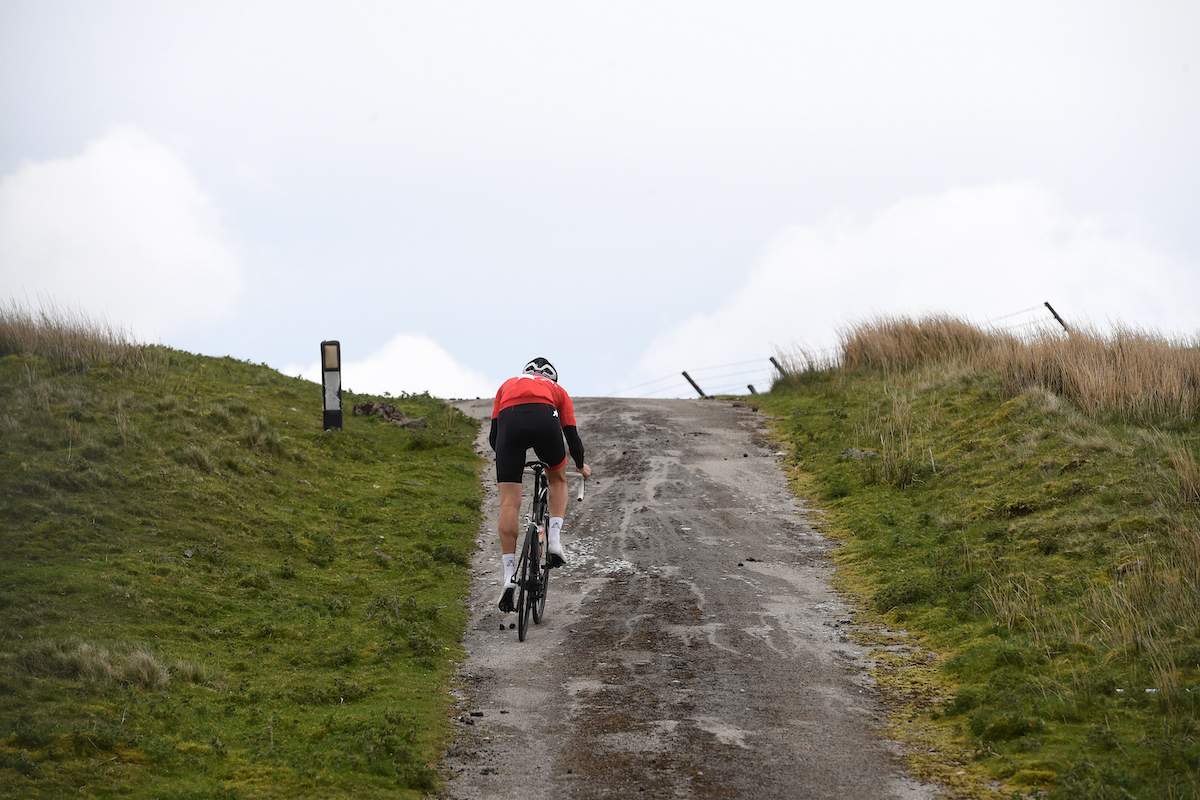
You might not get pristine tarmac, but a dead end road is still worth the effort.
Starting shallow, and quite rough, the early slopes of Leck Fell undulate slightly before the gradient then starts to get tasty when we pass a recently renovated farm house and it’s here we start searching for bigger sprockets. Passing between grassy banks the further we ride the more remote the feel. It’s tough on the legs but it’s also spectacularly wild and behind us views stretch out all the way across Morecombe Bay, (on a clear day) are just immense.
It really is a special place to ride your bike and as the asphalt comes to an end at the turn to Leck Fell Farm our three Dead Ends have been reached. I thank Toby for his brief company and for introducing me to such wonders then we raced back down to the bottom and parting ways I head back to Ingleton to complete the loop.
Packed into 111km were jaw dropping scenery, over 2,600m of elevation and three of the best dead ends in Britain, each one alive with wonder and beauty, with surprise and magnificence. So next time you see the familiar sign, why not deviate from your route and see what awaits, you never know it could be the most fantastic road you’ve ever ridden.
This feature first appeared in the March 2 edition of Cycling Weekly magazine. You can subscribe to CW, save on the cover price and get the magazine delivered direct to your door every Thursday and enjoy our race analysis and previews, product reviews, fitness advice and features.
Simon has been riding for over 30 years and has a long connection with Cycling Weekly, he was once a designer on the magazine and has been a regular contributor for many years. Arguably, though, he is best known as the author of Cycling Climbs series of books. Staring with 100 Greatest Cycling Climbs in 2010, Simon has set out to chronicle and, of course, ride the toughest cycling climbs across the UK and Europe. Since that first book, he's added 11 more, as well Ride Britain which showcases 40 inspirational road cycling routes. Based in Sheffield, Yorkshire, Simon continues to keep riding his bike uphill and guides rides, hosts events and gives talks on climbing hills on bikes!
